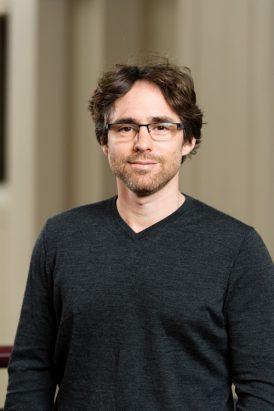Location
East Hall
530 Church St.
Room 4075
Ann Arbor, MI 48109
Phone
Primary Website
Biography and
Additional Title(s)
Dr. Gideon Rothschild received his B.Sc. in computer science and computational biology from the Hebrew University in Jerusalem, where he also earned his Ph.D. in neuroscience in 2012. He did his postdoctoral work with Loren Frank at the University of California, San Francisco, studying how the auditory cortex, hippocampus and prefrontal cortex interact during memory consolidation and retrieval.
Assistant Professor, Psychology, Adjunct Assistant Professor, Otolaryngology–Head and Neck Surgery
Research Interests
Sensation and memory are tightly linked in our everyday lives. Meaningful sensory experiences can transform to become long-term memories, and memories of past experiences influence how we process and perceive incoming sensory input. This bidirectional interaction between sensation and memory is key to healthy everyday life. Its failure is found in conditions such as post-traumatic stress disorder (PTSD), dementia, and schizophrenia. The Rothschild lab aims to understand the neural circuit mechanisms that underlie the bidirectional interaction between sensation and memory in health and disease.
To pursue these questions, our core experimental approach is to record and manipulate neural activity simultaneously from multiple brain regions involved in both sensory coding and memory processes. At the same time, rodents perform sensory- and memory-guided tasks. A brain region of particular interest in the lab is the auditory cortex, which is strongly involved in processing sounds. By monitoring neural activity in the auditory cortex as the animal is engaged in task performance and during subsequent sleep, we can tap into the sensory neural representation that salient sounds leave during and following experience.
We simultaneously record neural activity in the hippocampus to track how some of these sensory representations subsequently assimilate into long-term memories. The hippocampus is critical for forming new episodic memories and exhibits reactivation of neural activity patterns of past experiences, a phenomenon believed to support memory consolidation. By simultaneously monitoring and manipulating neural activity in the auditory cortex and hippocampus across learning, our lab aims to understand how information processing within each of these brain regions and communication between them underlies diverse cognitive phenomena linking sensation and memory.
Published Articles or Reviews
- Rothschild G., Nelken I., Mizrahi A. Functional organization and population dynamics in the mouse primary auditory cortex(link is external). Nature Neuroscience (2010) 13(3): 353-60.
- Jadhav S.*, Rothschild G. *, Roumis D. and Frank L. Coordinated Excitation and Inhibition of Prefrontal Ensembles during Awake Hippocampal Sharp-Wave Ripple Events(link is external). Neuron(2016) 90(1):113-27)(link is external) (* co-first author)
- Rothschild G., Eban E. and Frank L. A cortical-hippocampal-cortical loop of information processing during memory consolidation(link is external). Nature Neuroscience (2017) 20:251-259
- Lee J. and Rothschild G. Encoding of acquired sound-sequence salience by auditory cortical offset responses(link is external). Cell Reports (2021) 37, 109927
Awards
- University of Michigan Neuroscience Scholar Award (2017)
- Whitehall Foundation Research Grant (2018)
- Brain and Behavior (NARSAD) Young Investigator Grant (2019)
- Alzheimer’s Association Research Grant (2021)
